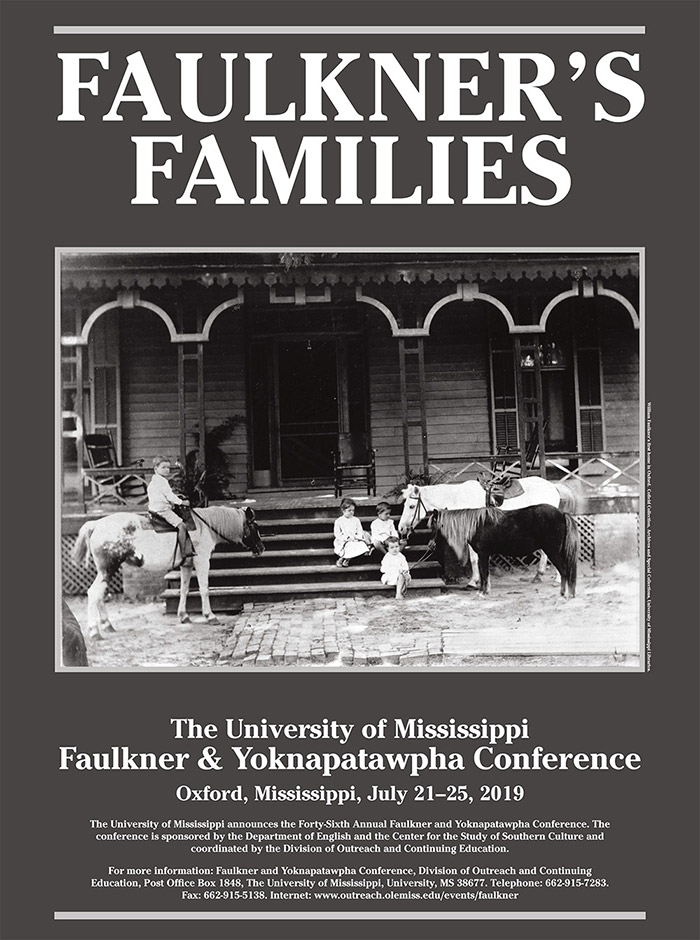
Panel. Daughters and Siblings
Location
Nutt Auditorium
Start Date
22-7-2019 11:00 AM
Description
- Undutiful Daughters: Women and Kinship Beyond Family in Faulkner / Julie Beth Napolin, The New School
- “It Takes Two People to Make You”: Reading Brotherhood in As I Lay Dying / Josephine Adams, University of Virginia
This paper addresses the relationship between Vardaman and Darl in As I Lay Dying in order to expose Faulkner’s understanding of the way in which sibling relationships—as opposed to parent-child relationships—can have a profound effect on the younger child’s psychological development. Much of the existing criticism on As I Lay Dying focuses on the Bundren children’s relationship to Addie: how they recognize, comprehend, and confront the loss of their mother. Engaging with the work of John Matthews, Judith Lockyer, and Stephen Ross, I argue that Vardaman creates his identity with and in terms of Darl, and that his interior monologues are a series of desperate, unconscious attempts to fill the void of his now-institutionalized older brother. In other words, Vardaman’s fundamental experience of loss in As I Lay Dying is not Addie’s death, but, rather, Darl’s departure for Jackson. - Sibling Psychology and Silences in the Narrative: Racial Memory in The Unvanquished Thomas L. McLaughlin, Jr., Villanova University
My talk argues that Bayard, the narrator of The Unvanquished, possesses a complex racial psychology, especially in how he internalizes his “sibling rivalry” with his enslaved friend and quasi-brother Ringo. Critics have labeled this book a “potboiler,” the bildungsroman aspects juvenile, and the racial psychology generalized and distant; some fault the narrative for failing to encapsulate the Southern reaction to Emancipation. However, the first-person account individualizes the experience of a Southern family left behind by war and faced with the complexities of Emancipation. Faulkner would have been unable to speak to a wider racial consciousness, historically, because of the silences in the archives. Thus, the narrative is not representational but specific, as Bayard is simultaneously both a claimant to and questioner of the Sartoris legacy. This legacy is informed by Bayard’s insecurities about Ringo’s increasingly important role in the family, as well as the ensuing subtle “sibling” power dynamic.
Relational Format
Conference proceeding
Recommended Citation
Napolin, Julie Beth; Adams, Josephine; and McLaughlin, Thomas L. Jr., "Panel. Daughters and Siblings" (2019). Faulkner and Yoknapatawpha Conference. 9.
https://egrove.olemiss.edu/fy/2019/schedule/9
COinS
Jul 22nd, 11:00 AM
Panel. Daughters and Siblings
Nutt Auditorium
- Undutiful Daughters: Women and Kinship Beyond Family in Faulkner / Julie Beth Napolin, The New School
- “It Takes Two People to Make You”: Reading Brotherhood in As I Lay Dying / Josephine Adams, University of Virginia
This paper addresses the relationship between Vardaman and Darl in As I Lay Dying in order to expose Faulkner’s understanding of the way in which sibling relationships—as opposed to parent-child relationships—can have a profound effect on the younger child’s psychological development. Much of the existing criticism on As I Lay Dying focuses on the Bundren children’s relationship to Addie: how they recognize, comprehend, and confront the loss of their mother. Engaging with the work of John Matthews, Judith Lockyer, and Stephen Ross, I argue that Vardaman creates his identity with and in terms of Darl, and that his interior monologues are a series of desperate, unconscious attempts to fill the void of his now-institutionalized older brother. In other words, Vardaman’s fundamental experience of loss in As I Lay Dying is not Addie’s death, but, rather, Darl’s departure for Jackson. - Sibling Psychology and Silences in the Narrative: Racial Memory in The Unvanquished Thomas L. McLaughlin, Jr., Villanova University
My talk argues that Bayard, the narrator of The Unvanquished, possesses a complex racial psychology, especially in how he internalizes his “sibling rivalry” with his enslaved friend and quasi-brother Ringo. Critics have labeled this book a “potboiler,” the bildungsroman aspects juvenile, and the racial psychology generalized and distant; some fault the narrative for failing to encapsulate the Southern reaction to Emancipation. However, the first-person account individualizes the experience of a Southern family left behind by war and faced with the complexities of Emancipation. Faulkner would have been unable to speak to a wider racial consciousness, historically, because of the silences in the archives. Thus, the narrative is not representational but specific, as Bayard is simultaneously both a claimant to and questioner of the Sartoris legacy. This legacy is informed by Bayard’s insecurities about Ringo’s increasingly important role in the family, as well as the ensuing subtle “sibling” power dynamic.

